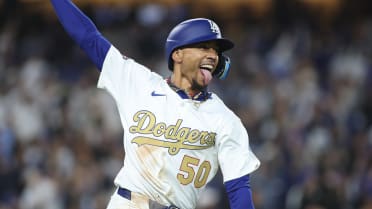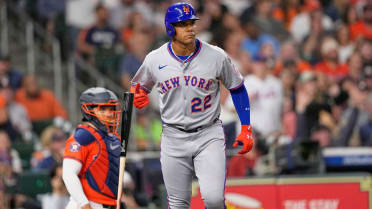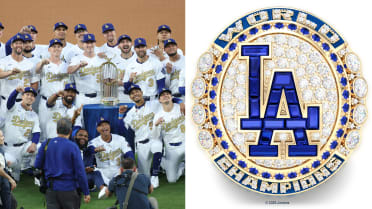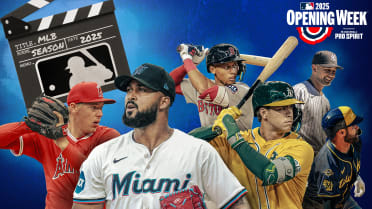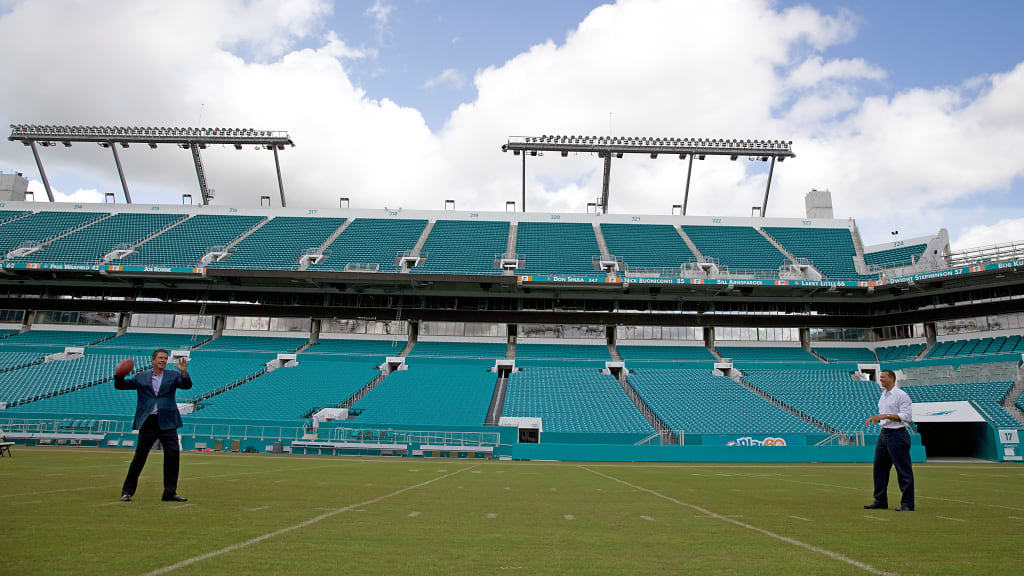
Before Alex Rodriguez hit 687 home runs and amassed more than 3,000 hits in the Big Leagues, he honed his craft on the diamond -- and also starred on the football field -- while growing up in Miami. During that time, Miami Dolphins quarterback Dan Marino was rewriting the NFL record books en route to the Pro Football Hall of Fame. Marino -- who broke every significant passing record, including those for career touchdown passes and passing yards -- was Rodriguez's childhood hero. From the 50 yard line of Sun Life Stadium, the Dolphins' home since 1987, Yankees Magazine editor-in-chief Alfred Santasiere III interviewed Rodriguez and Marino.
Alex, you were 8 years old when Dan arrived on the scene with the Dolphins. What were your first recollections of him in a Dolphins uniform?
AR: I remember this college kid coming from Pittsburgh, and everyone raving about how great of a quarterback he was. To grow up in Miami loving the Dolphins and the Orange Bowl stadium and having a quarterback lead us for the next 17 years was incredibly thrilling.
Dan, what was that time like for you?
DM: As a kid, I wanted to be a professional athlete, so it was a dream come true to be able to get into the NFL and have an opportunity to play for the Miami Dolphins. Right off the bat, [former Dolphins coach] Don Shula said, "I want you to come in here and act like you're going to be the starter." That got me really excited right away. I enjoyed working hard and seeing the results.
Why was the Orange Bowl such a special place for each of you?
AR: For anyone who grew up in Miami, the Orange Bowl is a lot like what the old Yankee Stadium was for people who grew up in New York. It was right in the middle of Little Havana, and it was a great place to watch the Dolphins and the University of Miami Hurricanes play football. No matter what happened in the community, the one constant was that the Orange Bowl was going to be there and there were going to be 80,000 people crammed in there like sardines every weekend, sitting on those metal bleachers.
DM: Well, for me, the Orange Bowl was my first home as a professional football player. The place was always rocking. When we were on the field there, you could feel the electricity in the air and you could literally feel the stadium shaking.
The other thing that made it so special was that we parked our cars in the same parking lot as the fans. We had a roped off section, but when we walked out of the Orange Bowl after games, we were essentially with however many fans were still hanging out. It was a lot of fun to be greeted by our fans, regardless of whether we had won or lost the game. It was a much different atmosphere than what it's like these days.
What is your favorite memory of the Orange Bowl?
AR: One of the best memories of my childhood -- or of my whole life for that matter -- was the Monday Night Football game in which Dan led the Dolphins to a big win against the undefeated Chicago Bears in 1985. You guys were big underdogs. Everyone thought that the Bears were going to run the table, but what you did that night was unbelievable. The other game that really stands out in my mind was when the Dolphins beat the New York Jets down here in 1985. Dan connected with Mark Duper on a bomb in the last seconds of the game, and Duper took it the rest of the way for the game-winning touchdown.
DM: The win against the Bears was my favorite game at the Orange Bowl, as well. The crowd was never louder than it was that night, and beating that team was a great accomplishment. We had several players from our undefeated 1972 team on the sidelines, and preserving their undefeated record by beating Chicago is something I will always be proud of.
The other game that stands out for me was when we beat the Pittsburgh Steelers in the 1984 AFC championship game. Having grown up in Pittsburgh, I was a Steelers fan. When we played them in '84, Jack Lambert and Donnie Shell -- guys I had rooted for when I was a little kid -- were still on the team. Now I was lining up against them for a chance to go to the Super Bowl. That was a unique experience, and winning the game was a great thrill.
Dan, by your second season, you were widely recognized as the best quarterback in the game. How were you able to handle the pressures of being a superstar in the NFL so well at just 23 years old?
DM: You're calling me a superstar, but when you're 23, you're not thinking that way. All I was thinking about was winning games each and every week. It was one of those deals where we had great receivers in Duper and Mark Clayton, along with a lot of other talented players on offense. We were involved in a lot of competitive games early on, and I ended up throwing for a lot of yards and a lot of touchdowns. When I was in the middle of it, I didn't even realize what I was doing, but afterward, you realize what it means to have broken so many records. Besides having Duper and Clayton with me, we had a bunch of veteran players, including Tony Nathan and Nat Moore, whose leadership really contributed to the way our young players handled things.
Alex, you were an All-State quarterback at Westminster Christian School. What did you enjoy about the position?
AR: When I was in high school, the top-rated quarterbacks in South Florida were Danny Kanell, Brian Griese and myself, and both of those guys made it to the NFL. So it was just a fun time to be a quarterback down here. But whether it was playing shortstop in baseball, point guard in basketball or quarterback, I enjoyed the competition and being a leader. Being able to come into the huddle, call a play and lead the team down the field was what I enjoyed most. It was also very satisfying to see all the preparation you do during the week, from practices to watching film of the opposing team, come to fruition. I had big dreams of going to the University of Miami and playing quarterback and shortstop, but when the Mariners drafted me with the No. 1 overall pick, I pretty much had to go.
What are your recollections of when the two of you first met?
DM: I remember when Alex was back in high school; he used to come to the taping of my TV show at my restaurant.
AR: I'll tell you the story in much more detail. When Dan was playing for the Dolphins, I watched everything that had to do with the team. I would watch his show all the time, and that was one of my favorite things to do each week. I read in the local paper that they were moving his show to Dan Marino's American Sports Bar & Grill, which was only about 2 miles from where I lived. It was perfect for me because I could just take the bus there and back, and it didn't cost anything to get a seat in the audience to watch the show. The first time I went, I was about 15 years old. I got there early and scouted things out because I really wanted to meet Dan. I went out to the parking lot, and there were about a dozen other guys out there who were all about my age. We saw Dan getting out of the car, and I rushed over to him and I said, "Hey, Dan, you're my favorite player. I wear No. 13 because of you. I'm a quarterback, but I also play shortstop." He put his arm around me, and he said, "Boy, you're a good-looking athlete. You have a bright future, young man."
I couldn't wait to tell my mom that story. When I got home, I said, "Mom, I'm going to make it. Dan thinks I have a future in sports." You never forget that. When I talk to young kids today, I still visualize that moment with Dan. It's amazing how much athletes influence kids.
Dan, what has it been like to see Alex become one of baseball's greatest players?
DM: It's been awesome. It's incredible that I met him when he was a young kid and now that kid is on the verge of hitting his 700th home run in Major League Baseball. He's not a kid anymore, and I guess that means that I'm getting old. But when you look at all of the things Alex has been able to do, in the game of baseball and even in the South Florida community, it makes me very proud to know him. Whether we're playing golf or having dinner together, it's always a real treat to be around Alex. It's cool when you see a young kid whose dreams were just like mine have those dreams come true.
Alex, can you describe what the experience of getting to know your childhood hero has been like for you?
AR: Ever since I was a little boy, I put Dan on a pedestal just like most of the kids in my generation. Then, I got to meet him, and I realized that he's an even better person than I could have ever imagined. It's great when you meet your heroes and they are as kind as Dan. From the first time we spent time together, he treated me like a little brother, like family. It's been a really respectful relationship. Dan really set the example for me on how to treat young players who I'm around these days.
Alex, how did you handle the pressures that came with stardom at a young age?
AR: There were parts of it that I handled really well, and there were parts that I didn't handle that well. I was 18 years old when I got called up to the Mariners, and I certainly could have used four years in college to become more mature before playing in the Big Leagues. There's a huge disconnect from being in a Major League clubhouse and trying to be a grown-up in the real world. But like the teams Dan played on in his first few years, we had a great group of veteran players, including some tremendous leaders and good family men in Ken Griffey Jr., Randy Johnson and Jay Buhner. It was great to learn from those guys.
How did you come to the decision to wear No. 13 when you arrived in New York?
AR: Well, I wore No. 3 before I was traded to the Yankees, and that obviously wasn't available because it was Babe Ruth's number. Thirteen was my number when I played quarterback, and carrying the legacy of Dan Marino and my roots in Miami to the Bronx was pretty cool. The New York Times mentioned it in an article that came out a few days after the trade. Later that day, Dan sent me a text that read, "Thanks for the props."
Dan, what does it mean to you that Alex chose No. 13 as a tribute to you?
DM: I'm honored. It made me a little relevant again. It made me feel really good when Alex mentioned it in his first press conference as a Yankee. I have worn No. 13 from the time I began playing sports. The reason I wore it was because my dad was my baseball coach, and he would always let everyone else pick their numbers before me. No. 13 was always left, and I thought, "You know what? I'm going to make this my number for good."
Dan, what are your thoughts on how consistent Alex has been for more than two decades?
DM: A lot of people have great talent, but do they have passion? Do they have a strong work ethic? Alex has it all. That's the difference between the great, great, great players and the ones who have been great for a short period of time. It's easier to be great when you're in your early to mid-20s, but it takes a lot more work and passion to stay great when you get into your 30s. There's only a few athletes in each sport who are great throughout their careers, and Alex is one of them.
AR: Thank you, Dan. And let me add to that. I'm sure Dan has seen a lot of quarterbacks and said, "This guy can throw better than me," or "He's faster than me." But at the end of the day, they probably didn't have the work ethic or the passion that he had, and that's why they're not in the Hall of Fame.
Where do you think Dan ranks among the great quarterbacks in NFL history?
AR: This is an easy question. Dan Marino is the greatest quarterback of all time. I'm lucky because he played for my favorite team, wore my favorite number, and he's my favorite guy. I don't want to start a debate with anyone, but that's where I stand on this topic.
Dan, having been there yourself, what advice would you give to Alex as he goes through the later part of his career?
DM: For me, the love of the game never changed, but physically, I couldn't do what I was able to do before. You're not going to play forever, but while you are playing, make sure that you still get excited for each at-bat and the start of Spring Training each year. Make sure that you still have the passion for not only the games, but also for all the work that you have to put in preparing for each season. I recently told Peyton Manning that once those mental aspects change, you have to think about life after the game.
Alex, you caught a few passes from Dan this morning. Was that on your bucket list?
AR: Honestly, I had never thought about it. But when he grabbed the football, I thought to myself, "Oh, my God. This is a childhood dream, and it's about to happen." That was really cool. It's something I'll never forget.
Alfred Santasiere III is the editor-in-chief of Yankees Magazine. This article appears in the April issue of Yankees Magazine. Get this article and more delivered to your doorstep by purchasing a subscription at yankees.com/publications.
